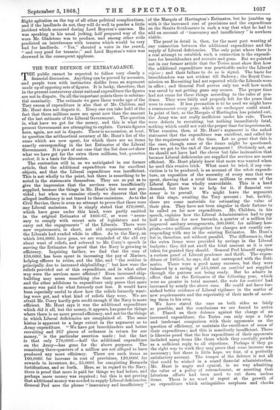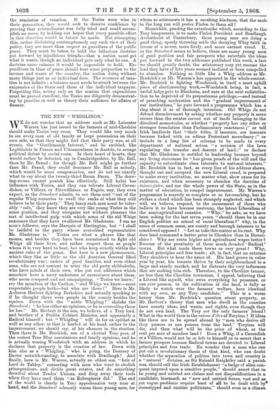THE TORY DEFENCE OF EXTRAVAGANCE.
THE public cannot be expected to follow very closely a financial discussion. Anything can be proved by accounts, and people turn with instinctive dislike from an argument made up of opposing sets of figures. It is lucky, therefore, that in the present controversy about national expenditure the figures are not in dispute. On all the important points there is substan- tial unanimity. The estimate we gave three weeks ago of the Tory excess of expenditure is also that of Mr. Childers, and Mr. Hunt does not dispute it. Every one can take hold of the fact that three millions more are spent now than the amount of the last estimate of the Liberal Government. The question is, what have we got for the money, and this is what the present Government are attempting to explain. Certain figures here, again, are not in dispute. There is no occasion, at least, to question the arithmetical accuracy of Mr. Hunt's list of the sums which are now spent, for which there are no items exactly corresponding in the last Estimates of the Liberal Government. It is part of our case that the list does not show -what we have got for the extra three millions, but, quantum .valeat, it is a basis for discussion.
The contention still is, as we anticipated in our former article, that the additional expenditure was for excellent objects, and that the Liberal expenditure was insufficient. This is not wholly to the point, but there is something to be noted in the statements themselves. They are so put as to give the impression that the services were insufficiently supplied, because the things in Mr. Hunt's list were not pro- vided; but when we examine closely we discover that the alleged inefficiency is not traced to these omissions. As to the Civil Service, there is even no attempt to prove that there were any Liberal omissions. It is simply stated that 870,0001., which have gone under this head, were partly omitted in the original Estimates of 1866-67, or were "neces- sary to comply with recent acts of legislature and to earry out the engagements" of the Liberals. There were mew requirements, in short, not old requirements which the Liberals had evaded while in office. As to the Navy, on which 584,000/. have gone, we are reminded of the old cry -about want of reliefs, and referred to Mr. Corxy's speech in moving the Estimates for proof that the Navy is growing in efficiency. Inquiring farther, we find that the sum of 138,000/. has been spent in increasing the pay of Marines, helping officers to retire, and the like, and "the residue is principally due to increased shipbuilding ;" but how were the reliefs provided out of this expenditure, and in what other way were the services more efficient ? Even increased ship- building may mean something else than more efficiency, and the other additions to expenditure only prove that more money was paid for what formerly cost less. It would have been especially useful to show how the reliefs formerly want- ing were got, and what kind of reliefs they were. We are -afraid Mr. Corry hardly gets credit enough if the Navy is more efficient. Mr. Hunt says it was the additional expenditure -which did it all, but the money, it appears, has gone for things where there is no more proved efficiency, and not for the things in which Liberal deficiencies are complained of. The same hiatus is apparent to a large extent in the argument as to Army expenditure. "We have got breechloaders and better recruiting and 267 pieces of ordnance in return for our money," is the particular assertion made ; but the fact is that only 770,000/.—half the additional expenditure on the Army—has gone for the above purposes. The remaining three-quarters of a million are not alleged to have produced any more efficiency. There are such items as 100,000/. for increase in cost of provisions, 120,000/. for rewards to inventors, Sze., 35,000/. for completing Bermuda fortifications, and so forth. Here, as in regard to the Navy, there is proof that more is paid for things we had before, and perhaps more money was required ; but this is not proving that additional money was needed to supply Liberal deficiencies. General Peel uses the phrase "inaccuracy and insufficiency" of the Marquis of Hartington's Estimates, but he jumbles up with it the increased cost of provisions and the expenditure
on the Straits Settlements in such a way that what he had to add on account of inaccuracy and insufficiency" is nowhere visible.
The proof in detail is, then, for the most part wanting of any connection between the additional expenditure and the supply of Liberal deficiencies. The only point where there is a real attempt to establish such a connection is the expendi- ture for breechloaders and recruits and guns. But we pointed out in our former article that the Tories must show first how the additional expenditure was practicable under the Liberal re'gime ; and their failure to do so is signal. The haste for breechloaders was not evident till Sadowa ; the Royal Com- mission on Recruiting had not reported while the Liberals were
in office ; and General Peel proves only too well how much was saved by not getting guns any sooner. The proper time
had not come for these things according to the rules of pru- dence. They were fairly and properly left for the years that were to come. If less precaution is to be used we might have a rearmament every year, which no exchequer could stand. In point of fact, as the Marquis of Hartington has pointed out, the Army was not really inefficient under his rule. There were defects in recruiting, but nothing immediately fatal, nothing which could not wait the proper time for improvement. What remains, then, of Mr. Hunt's argument is the naked statement that the expenditure was excellent, and. called for by the requirements of the time. Let us grant that this is the case, though some of the items might be questioned. Have we got to the end of the argument ? Obviously not, or we should not have had the clever but false insinuation that because Liberal deficiencies are supplied the services are more efficient. Mr. Hunt plainly knew that more was wanted when he used this evasive trick. What must be tried, if any con- viction is to be produced, is an account of the whole expendi- ture, an exposition of the necessity of every sum that was spent, showing that a total three millions in excess of the Liberal figure was wholly unavoidable. This is a hard demand, but there is no help for it, if financial eco- nomy is to prevail. We might leave the argument at this stage, awaiting the Tory account ; but, luckily, there are some materials for estimating the value of their plea. They have not been singular in their fortune to be called on for new expenditure. Mr. Childers, in his speech, explains how the Liberal Administration had to pay half a million for new barracks, a quarter of a million for improved sanitary arrangements, 300,000/. for military hos- pitals,—two millions altogether for charges not exactly cor- responding with any in the existing Estimates. Mr. Hunt's list is, therefore, not without parallel. The difference is, that the extra items were provided by savings in the Liberal budgets ; they did not swell the total amount as it is now taken for granted they should. General Peel himself supplies a curious proof of Liberal prudence and thrift. The expen- diture of 1865-6, he says, did not correspond with the Esti- mates. There were a good many excesses, but they were balanced by a saving of 515,000/. on materiel not supplied through the pattern not being ready. But he admits in effect that in the Estimates of the following year, which were no greater in total amount, the vote for mate'riel had increased by nearly the above sum. He could not have fur- nished better evidence of Liberal vigilance in the matter of new requirements and the superiority of their mode of meet- ing them to his own.
We have stated the case on both sides as fairly as possible, and the conclusions we are forced to arrive
at. Placed on their defence against the charge of an increased expenditure, the Tories can only urge a false and irrelevant comparison with their opponents on the question of efficiency, or maintain the excellence of some of their expenditure ; and this is manifestly insufficient. There is likewise proof that the less expenditure of their opponents included many items like those which they carefully parade as a sufficient reply to all objections. Perhaps if they go the right way to work they may prove that some increase was necessary ; but there is little hope, we fear, of a perfectly satisfactory account. The temper of the defence is not all that could be wished in a sound financial administration. Mr. Hunt is angry and cynical, in no way admitting the value of a policy of retrenchment, or asserting that laborious efforts had been used to cut down useless items. There is no word of regret at the growth of an expenditure which extinguishes surpluses and cheeks the remission of taxation. If the Tories were wise in their generation, they would seek to deserve confidence by proving that retrenchment was fully tried and could accom- plish no more, by holding out hopes that every possible effort in that direction would in future be made. Not attempting this, rather disdaining contemptuously any such view of their policy, they are more than suspect as guardians of the public purse. They must be taken to hold the fallacious doctrine put forward by injudicious friends—that a nation must get what it wants, though an individual gets only what he can. A doctrine more ruinous it would be impossible to hold. Ex- penditure in time of peace should bear some proportion to the income and wants of the country, the nation doing without many things just as an individual does. The resource of taxa- tion is not infinite ; a balance must needs be struck between the exigencies of the State and those of the individual taxpayer. Forgetting this, acting only on the maxim that expenditure must be proved excellent, the Tories are diligently demonstrat- ing by practice as well as theory their unfitness for affairs of finance.































 Previous page
Previous page